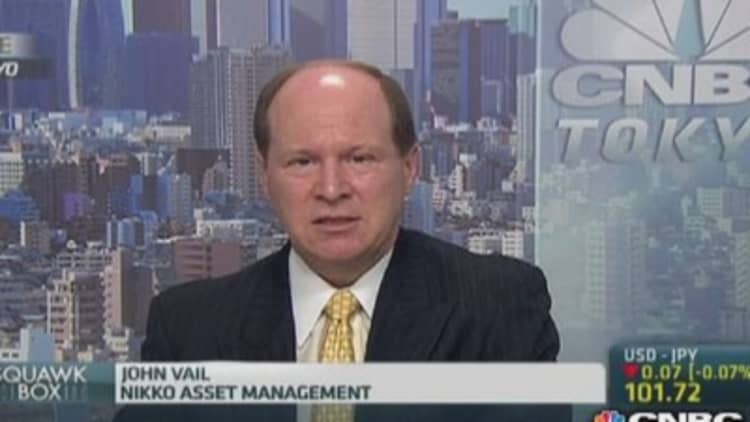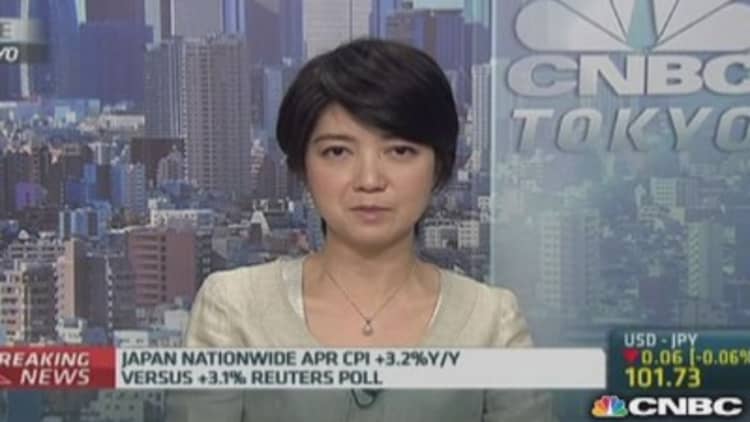
Japan's core consumer prices rose 3.2 percent on year April, marking the fastest rise in 23 years after an increase in the country's sales tax boosted prices, data on Friday showed.
The rise in the core consumer price index (CPI), which strips out volatile food prices but includes oil products, was above analyst forecasts in a Reuters' poll for a 3.1 percent rise and a 1.3 percent increase in March.
Read MoreThat didn't take long: Japan eyes stimulus exit
"I think deflation is dead (and the) structural bear market that people have been watching over the past decade is also dead," John Vail, chief global strategist, investment strategy group at Nikko Asset Management, told CNBC.
"There will be cycles up and down going forward, according with the global cycle, but essentially you've got a reflationist central bank now," he added.
The Bank of Japan aggressively pumped money into the economy over the past year in a bid to overcome deflation.
"The inflation figures are almost in line with BOJ's optimistic outlook for the CPI numbers," said Junko Nishioka, chief economist Japan at RBS.
Read MoreJapan's sales-taxhike turns shoppers away
"So even if we exclude the impact of the consumption tax hike in April, we confirm that (the) underlying trend of inflation number is picking up gradually above the 1.0 percent level. It is fair to say that Japan has got out of the deflation condition since 1997."
The BOJ said last April it would aim to lift inflation in Japan to 2 percent over a two year period.
Household spending, output tumble
Japan lifted its sales tax to 8 percent from 5 percent in April and data is in the spotlight as economists assess how the economy is holding up under the first consumption tax hike in 17 years.
Read MoreWomenomics: Japan's newgrowth bazooka?
Other data released on Friday confirmed expectations that the tax hike is taking a toll on the economy.
Household spending in April fell 4.6 percent from a year earlier, compared with expectations in a Reuters poll for a 3.2 percent fall.

Manufacturing output tumbled 2.5 percent in April from a month earlier, greater than expectations for a 2 percent fall.
A day earlier, data showed Japan's retail sales tumbled 4.4 percent on year in April as a rise in the country's consumption tax weighed on spending.
Read MoreWhy wages in Japan are set to rise: Shinzo Abe
The tax hike is expected to weigh on economic activity in the second quarter but economists say there are some signs that Japan's economy is likely to weather the impact.
Indeed, among Friday's data deluge were also numbers showing that the availability of jobs in April rose to the highest in nearly eight years. That's an encouraging sign that a tighter labor market will boost wages and underpin consumer spending.
Japan's jobless rate held steady at 3.6 percent in April, matching the readings for March and February, a level that had last been seen in July 2007.
Read MoreKuroda: Impactof Japan tax hike will be contained
"The consumption tax impact is manageable and people have overstated the impact of the tax hike," Daisuke Nomoto, a senior portfolio manager at Columbia Management Investment Advisers, told CNBC before the release of Japan's data on Friday.
"After May, consumption should get back to a normal trend," he said.

